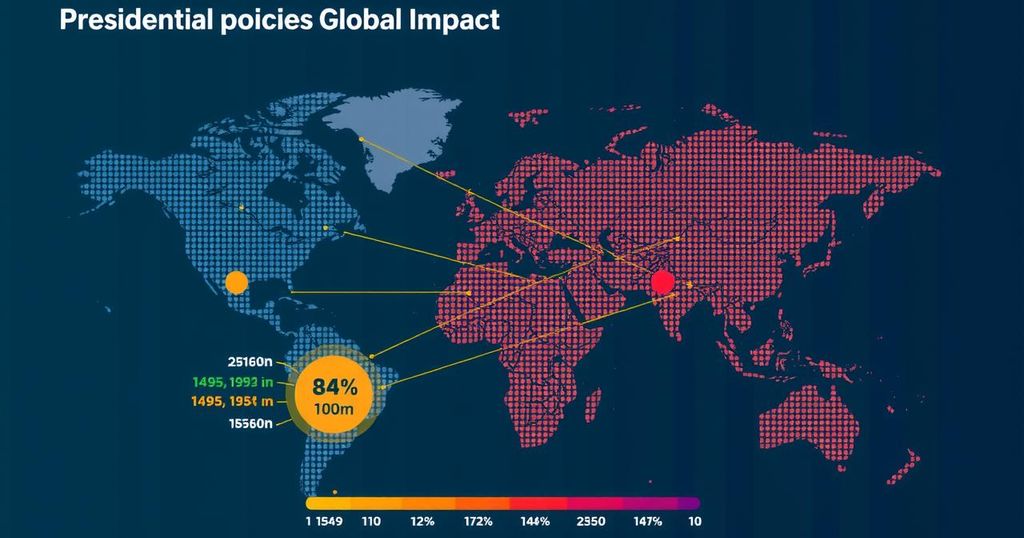Donald Trump’s potential reelection in 2024 raises significant concerns for the global economy, particularly with his plans to implement tariffs on imports. This policy approach, combined with bipartisan trends favoring domestic protectionism, threatens to increase consumer costs and exacerbate dependencies on American technology. Meanwhile, nations such as China and Europe are compelled to adapt, leading to a race for subsidies that may detract from addressing urgent global issues, such as climate change and humanitarian crises.
The potential return of Donald Trump to the presidency in 2024, alongside his intention to impose tariffs on all imports, poses significant challenges for the global economy. The United States is a major player in technological innovation, investing heavily in research and development while achieving remarkable success in various fields. However, other nations must be cautious not to become overly dependent on American technological advancements. The trend towards an “America First” policy, which gained momentum during Trump’s first term and has been perpetuated by subsequent administrations, underscores a broader bipartisan commitment to protecting domestic industries. Trump’s strategy included imposing substantial tariffs, which have historically resulted in increased consumer costs, as exemplified by the tariffs on washing machines that raised prices by 12%. The current administration under President Biden has also upheld some of Trump’s tariff policies, raising tariffs on electric vehicles, solar cells, and batteries from China. This has illustrated a deliberate choice to prioritize US manufacturing amidst an ongoing climate crisis, even as Biden sought to negotiate tariff reductions with Europe while stimulating competition through subsidies. The emergence of US industrial policy with its focus on self-sufficiency poses complications for nations like China, which is grappling with overcapacity issues stemming from its export-driven growth. Concurrently, Europe, facing economic constraints, has committed to matching US subsidies to remain competitive. Such subsidy races not only strain global resources but could have been directed toward urgent global needs like enhancing energy access in Africa. The geopolitical landscape remains rife with tension, particularly following the invasion of Ukraine, which may have been mitigated had the international community, particularly the US, adopted a more assertive stance beforehand. Furthermore, Europe’s dependence on Russian gas, highlighted by Trump’s warnings, reveals the strategic vulnerabilities that can arise from over-reliance. Looking ahead, opportunities exist for Europe and China to collaborate to resolve trade disputes, particularly concerning tariffs on green technology. Strengthening trade relations could advance energy independence for Europe while allowing China to address its industrial challenges. The European Union’s potential to broker beneficial trade agreements could play a critical role in alleviating global tensions and contributing to climate initiatives. As global crises exacerbate, including increasing hunger and persistent conflicts, the likelihood of a Trump administration leading productive international initiatives appears slim. This uncertainty underscores the necessity for nations to enhance cooperation while reducing dependency, ensuring a more resilient global economy amidst a potentially fragmented international landscape. Ultimately, the world must adapt to the shifting dynamics of global leadership and respond proactively to looming challenges. In the interim, a collective effort towards collaborative practice is paramount, prioritizing sustainable development independent of overreliance on any single nation.
The article examines the implications of Donald Trump’s possible reelection in 2024 and the ensuing tariffs on imports, emphasizing the potential effects on global economic dynamics. The piece highlights the historical context of US economic policies that prioritize domestic production over international cooperation, exacerbating concerns of dependency, particularly in terms of technological advancements and energy resources. Furthermore, it discusses the roles of China and Europe in response to these policies, and the broader implications for international relations and global crises.
In conclusion, the potential return of Donald Trump to the presidency signifies a continuation of policies that may further isolate the United States economically. While the US seeks to protect its industries through tariffs and subsidies, it risks fostering dependency issues that could destabilize global economies. Collaborative actions among nations, particularly between Europe and China, could pave the way for improved trade relations and sustainability, promoting a more balanced approach to tackling worldwide challenges. Nevertheless, the overarching trend suggests that an isolationist stance may only escalate tensions without resolving the pressing issues faced globally.
Original Source: theconversation.com






